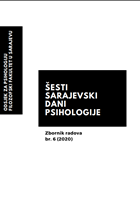Model uspješnog uključivanja korisnika usluga u mentalnom zdravlju i njihovih porodica u proces oporavka: Preliminarni rezultati studije IMPULSE
Model to Successfully Engage Mental Health Service Users and Family in Recovery Process – Preliminary Results of the Impulse Study
Author(s): Remzija Šetić, Tihana Majstorović, Mina Aleksić, Mirjana ZebićSubject(s): Individual Psychology, Social psychology and group interaction, Neuropsychology, Clinical psychology, Methodology and research technology, Health and medicine and law
Published by: Filozofski fakultet Univerziteta u Sarajevu
Keywords: user associations; mental health; IMPULSE study;
Summary/Abstract: The IMPULSE study, led by Queen Mary University of London, offers a unique opportunity to radically improve care for people with psychotic disorders in lowand middle-income countries in Southeast Europe. One of the goals of the study is to include mental health service users and their families in the recovery process. Involvement is based on (a) forming of advisory bodies of users and families that monitor and direct the steps in the project, and (b) the development of a model of user led associations, in which professionals and users of mental health services manage the association and develop it together. In Bosnia and Herzegovina, the Menssana Association is included in the study as a model for user - led association, and the study is also being conducted in Serbia, Montenegro, Northern Macedonia and Kosovo. The aim of this paper is to present the preliminary results of the IMPULSE study on the analysis of the characteristics of user-led associations, internal organization, capacity, challenges and the role of users in the association. In addition to what was stated, we aim to compare the previously mentioned characteristics of associations of health service users that are not primarily related to mental health problems. This goal is set in order to better understand the challenges that associations face and the perspectives for their future development. The results confirmed the correctness of the basic idea that people living with problem health are the best source of information and the best advocates of their rights in society, and with adequate help from professionals and volunteers, adequate and long-lasting activities of the association are ensured. We have gained significant insight into the functioning of user associations in the region. We determined the best model of action for the user-led association.
Journal: SARAJEVSKI DANI PSIHOLOGIJE: ZBORNIK RADOVA
- Issue Year: 6/2020
- Issue No: 6
- Page Range: 277-293
- Page Count: 17
- Language: Bosnian

